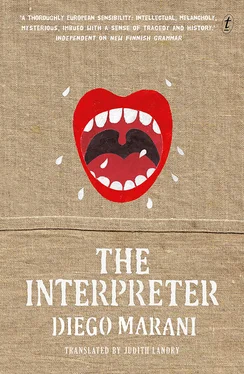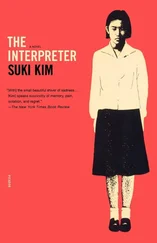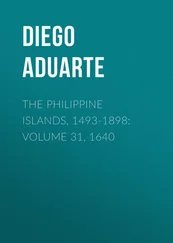I pushed the door closed with my foot and paced up and down the room, scrutinising the postcard down to the last detail: it was a view of the harbour, the very same one I could see from my own window. I peered out through the rain-streaked glass: the bay, the aquarium, the landing stages, the seafront. All that was missing on the postcard was the ship. Smoke was now pouring from both funnels and I could make out the dim outlines of the queue of cars driving up the gangway and into the hold, their headlights reflected in the puddles. Suddenly the sun burst through the clouds and the coppery sunlight lit up the side of the ship. Toompea , I read on its riveted sheet metal, and at that moment the hooter sounded again, as though it were hailing my discovery. I rushed downstairs without even bothering to take my luggage.
‘The ship!’ I shouted in the direction of the porter, making him jump. ‘The Toompea , when does it leave?’
‘This morning.’
‘And where’s it headed for?’
‘Tallinn!’
I hurtled towards the quay at breakneck speed, dashing across the road between the honking cars and through the passenger terminal until at last I found myself beside the ship. The anchor chain was being weighed with a deafening clang, the ropes were being lifted from the moorings, but the gangway was still open. The sailor on duty didn’t play hard to get: he pocketed the wad of dollars I offered him, and a few minutes later I was on deck, puffing and panting, watching Klaipeda receding into the distance and finally disappearing altogether, eclipsed by the grey furrows of the sea.
I stayed holed up in my cabin until late in the afternoon; only when I saw the light fading through the porthole did I dare venture up on deck. The sailor had brought me a travel document stating that I had embarked at Kiel; he had taken down my passport details, and also demanded another few hundred dollars, since he had to square it with the man in the ticket office in order that everything should appear in order. I sat down in the bar on the lower deck, which was quieter than the others. I was hungry, but didn’t dare go to the restaurant; I was afraid that whoever had lured me on board the Toompea might be setting me a trap. I was hoping somehow to recognise my mysterious pursuer before he noticed me. I peered through the glass into the neighbouring restaurant, scrutinising every face, even those of the waiters, while bolting down peanuts to take the edge off my hunger. That night I barricaded myself into my cabin, and set the alarm clock to wake me every hour, at which point I would check the door and even the screws on the porthole.
The following morning, the sea was calm and bright. It was a peerless June day, white foam was dancing on the tips of the green waves at the ship’s side; people leaned over the handrails, lifting their faces to the warm, light wind. Children were playing, elderly couples were having their photographs taken on the sun-drenched decks; there was a party mood afoot. I too wanted to join that carefree crowd, and went to sit on a bench on the lower deck, out of the wind, from which there was a view of a distant coastline: possibly Latvia, I thought.
In the afternoon the light changed, the blue of the sea became more intense and a strong wind got up. The crowd on deck thinned out and most people drifted off inside; through the glass I could see small family groups seated in front of cups of steaming chocolate. Only a few couples were now left in the deckchairs. I too went inside. Wandering around along the upper decks, I found myself in the corridors outside the first-class cabins; I checked the swimmers jumping off the diving boards in the swimming pool, ambled around among the fruit machines in the casino, where elderly ladies, their handbags clutched close to their chests, were stubbornly sending coloured images whirring in the hopes of seeing a flood of coins suddenly pouring out of the chrome funnels. But I had absolutely no pointer as to which of these unknown faces might be that of the man who had drawn me aboard the Toompea and, without such knowledge, I might be walking straight into the fatal trap which would be my undoing. I couldn’t imagine what form my death would take — whether I too would be transfixed by a narwhal’s tusk, charred to a cinder in the boilers in the engine room or drowned at sea, my body mauled by the propellers. At all events, I’d had enough of waiting, so I resigned myself to the idea of revealing myself; that was the only way to make something happen. I went into the restaurant and sat down at a table in the middle; I ate my meal slowly, peering round me in search of a face, a glance. I chose fine wines and complicated dishes, requiring the attentions of several waiters; to prolong my stay, I also ordered coffee, liqueurs and cigars. Smoke and alcohol caused my mind to glaze over; I was so tired that I could hardly see. But I carried on studying the room, staring so blatantly at my fellow diners that I alarmed the ladies and puzzled the men in their blue suits. Finally, hoisting myself wearily out of my seat, I decided to go out on deck again, choosing a sunny spot in the bows, where the wind was at its strongest, and the waters were severed majestically by the prow of the great ship as it made its way eastwards. On the deck below me a sailor was rolling up some ropes; seagulls were hovering patiently in search of food. People were starting to come out again; children were playing, women were sunbathing in deckchairs, their eyes screwed up against the sun.
Suddenly a girl ran towards the handrail, shouting as she did so. The sailor dropped his rope and looked out to sea, shielding his eyes with his hand. I too got up to cast a look over the expanse of glittering water: some distance from the ship, in a strip of sea that looked calmer than the rest, I saw a shoal of narwhals darting in and out of the darker water, their long tusks glittering fiercely, like a barrier of gigantic thorns slung over the sea; they were ducking, then re-emerging, perfectly aligned. I noticed another shoal, nearer the horizon, swimming slowly in serried ranks, their tusks all pointed in the same direction, as though engaged in some mass migration, their backs glinting in the late afternoon sunlight. Some were lighter in colour, almost white; others were black, with leathery, lumpy noses.
At that moment the hooter sounded, and the ship slowed down and began to roll; the loudspeakers gave out the alarm signal and the red lights in front of the doors leading to the cabins began to flash. Sailors rushed out on deck and began loosening the ropes of a lifeboat. I stood aside to get out of their way and went to join a group of people leaning against the railings; it was then that I realised that I was the only person looking at the narwhals. The crowd around me were pointing at something in the other direction; I screwed up my eyes and looked out to sea in the direction of their pointing fingers.
‘Man overboard!’ a sailor shouted.
Amidst the glare, some ten metres from the ship, I caught sight of something floating — something that looked distinctly sinister. Life jackets were thrown out and the lifeboat was lowered into the water. All eyes were on the blurred shape bobbing on the surface. Sailors with harpoons climbed down into the boat but soon started shaking their heads and waving their oars in the direction of the ship. The dripping lifeboat was hauled up again, and a hideously bloated body was laid out on the deck amidst a now silent crowd. Two nurses with a resuscitator appeared and applied it to the man’s chest; his body quivered, his arms twitched and his knees shook, but the nurses exchanged gloomy glances. After a couple more attempts they put their resuscitator back in its case. They were about to cover him with plastic sheeting when I pushed my way forward through the silent crowd and stared in horror at the corpse.
Читать дальше












